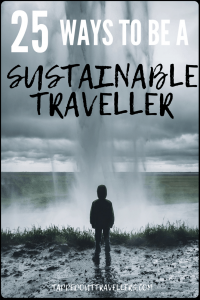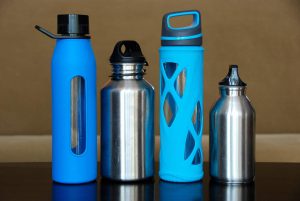Last Updated: July 25, 2018

Why is sustainable travel important
Travellers have more places to go and more ways to get there than ever before, and with that comes an even greater responsibility to safeguard the world’s cultural and natural treasures for future generations. The environment is obviously important to tourism. Both the natural environment (such as beaches, forests, waterways) and the built environment (such as historic buildings and ruins) must be preserved for an area to be environmentally sustainable.
Being a sustainable traveller doesn’t have to cost more.
- Be sure to purchase items with less packaging. This can be for travel prep items, grocery store items or everything in between. The first step to going green is our everyday purchases
- No straws. It may seem small but eliminating straws from our restaurant orders can go a long way. If one is required, ask for paper straws, bring your own metal straw (though it needs to be washed after every use) or drink straight from the cup. There are alternatives for the little ones as well; bring a silicone lid with built-in straw that covers a regular glass cup, or transfer the drinks to a child-friendly cup that you have brought with you. Asking for alternatives or refusing plastic straws shows management that you are serious about the environment. If enough clients start to show an interest, the restaurant may start to make changes.
- Bring your own bag for shopping. Whether it be grocery shopping, at the farmers market or shopping center, bringing your own bag can greatly reduce the impact that your shopping has on the environment.
- Get your food from the grocery store instead of fast food or packaged meals. Both create a lot of waste and neither are particularly healthy either. Visiting a grocery store or farmers market and self-catering while on vacation will also save you a ton of cash.
- Purchase fruit and veggies instead of packaged snacks. When making snack packs for theme parks or day trips, purchase them from the store and pack them into reusable containers. This is both better for the environment and your health vs prepared snack packs that contain a lot of sugar and preservatives. Many of these packaged items are being banned from schools due to allergies and possible nut contamination.
Eco-friendly ways to travel
- Book direct flights. Just like starting and stopping a car burns gas, take off and landing burn unnecessary fuel on airlines. Booking direct flights saves time, energy and fossil fuels. They may be more expensive but they are worth it. If your nearest airport doesn’t have a direct flight to your destination of choice, try looking around at alternatives; can you get to another airport for a better deal and a direct flight?
- The vehicle or mode of transportation is important. Are you using a car to get from one city to the next or train? How are you exploring the city itself? All of these little details start to add up. Walking is the best mode of transportation per person. Public transport is the second best way to travel. Road trips are not out of the question yet; the type of vehicle you own vs the type of public transit and how it is powered is also important when making this calculation
- Bring water bottles. It doesn’t really matter what kind you bring, bring a reusable water bottle and fill up at public fountains, restaurants and your hotel room. Doing this can save you hundreds of dollars per year and keep countless plastic bottles out of the oceans and landfills. But reusable water bottles are made of plastic… some are. But they are made of different kinds and are BPA FREE. What does BPA free mean? It means particles of plastic won’t leak into the drinking water and poison your body. This is why plastic water bottles have an expiry date and are not suggested to be used more than once. Single-use plastics are the number one producer of waste around the world.
- Take a shower, not a bath. Unless you are the type of person to take a 2-hour shower, most tend to get in and out fairly quickly. Having a proper and clean shower head can also help reduce water waste (though this isn’t in your control while on holiday), having a bath uses much more water than showering. If the little ones weren’t rolling in mud, have them share a bath or save the bath water for the next child. If they are completely filthy, have them shower with mum or dad and save on water that way.
- Avoid hotel laundry service. While this is obvious for anyone wishing to save a few bucks or travel on a budget, it does need to be said. Hotel laundry service will wash all colours separately, just like mum taught us, but they won’t mix items from separate guests – clearly. So they could end up using an entire load just for your one white bra. Not a proper use of water or energy. Wash that bra by hand and head to the laundromat for all of your laundry needs.
- Reuse hotel towels. I don’t know what it is about hotels that make people carefree but the amount of towel waste is crazy. You have just washed your body, then dried it with a towel. It is safe to say that this towel is fairly dirt free, as long as we all know how to shower properly. Hang that towel to dry and use it again tomorrow.
- Don’t take too many maps and brochures. It can be easy to just grab a bunch and think about it later but what are you doing with them afterward? In the bin? And now they need to make that much more product because so many people are taking a handful Willy nilly. Take what you need and bring the rest back, or just don’t take them in the first place.
- Use public transit or bike/walk to your destination. Once you have landed at your destination city, use public transit to get around. There is no need to cause more traffic or air pollution by using your own car. Many hotels are helping by offering free or discounted transit tickets with your reservation as well as a charge for each time your car leaves the parking garage, on top of the nightly rate.
- Your leftover toiletries. You may not have thought of this one. After you have opened a bottle of hotel shampoo, take the bottle with your at the end of your stay. It will be thrown away once housekeeping comes along. This can be used for your next vacation. If you want to take a sealed pack of shampoo, the local homeless shelters and women’s shelters are always seeking donations and this has been one for the easiest ways to contribute.
- Adapt to local culinary staples. When ordering from a restaurant or shopping at a grocery store, there are bound to be a handful of foods that are native to your part of the whole. Try purchasing something from this part of the globe instead; not only are you sampling the local cuisine and getting to know the area you are travelling to, you will be showing the stores that you are not interested in imported foods. These foods create a large carbon footprint just to get to the market, in order to serve tourists and their own specific tastes.
- Leave no trace’. We have all heard that saying “take only photographs, leave only footprints”. There is a reason for this; souvenirs cost a lot of money and they create a lot of waste. There is no reason to purchase half of the souvenirs most of us purchase and we would be just as happy without them.

- Eco-friendly hotels. There is a growing trend of eco-friendly hotels. Check out their websites, make sure they are compliant and choose these hotels over their (cheaper) chain alternatives. Again, this starts to show major brands and city council where tourists prefer to spend their money and will eventually make changes accordingly.
- Pack light. This doesn’t seem much of a sustainability problem, luggage is reusable. But, with fewer pieces, you can move around easier and avoid taking a taxi to and from the airport.
- Pick your products carefully. When getting ready for vacation, everyone makes their necessary purchases. Choosing one brand over another, one style over another can have a huge impact on the environment, and the bottom line of brands we don’t agree with.
- Reduce wasteful water use. This goes back to my limited shower time tip, but also when brushing your teeth, cooking, flushing the toilets… reduce the amount of water you waste.
- Carbon offsets. If you can’t reduce your waste, think about purchasing carbon offsets. The money earned from these purchases goes to funding research to eliminate the pollution already in the atmosphere, as well as reducing our dependency on fossil fuels and other polluting agents. It doesn’t keep the environment clean, but it is a step in the right direction to making a better tomorrow.
- Stay longer at each destination. The less you travel around, the less pollution you are creating, period. This will ultimately mean you are visiting fewer places during your limited vacation time but you will be able to see more of each destination and invest more of your hard-earned dollars into the local economy.
- Eat local. Visit farmers markets, co-ops, local restaurants… anything to stay out of fast food chains.
In the end, the destination is the biggest way to reduce your energy footprint. Research the energy generation mix of that destination and find out how you can minimize your impact on the environment.
Your Thoughts...
Please share your thoughts in the comments or reach out on social media...We would love to hear from you.
You May Also Like
How to Make Travel Affordable, as an Expat
Get Out Of Debt. Start Traveling.
Best Packing Cubes for Traveling


